7 US National Parks with Jaw-Dropping Night Skies Perfect for This Summer

Are you ready to be blown away by the beauty of the night sky on your next National Park trip? If you’ve ever wanted to stargaze under some of the clearest, most dazzling heavens in the US, you’re in luck!
After vanlifing for two years across the West and camping under the stars countless times, I’ve encountered some truly incredible night skies. Here, I’ve rounded up seven of the best national parks for stargazing. All of these parks are designated dark sky parks, meaning they have exceptional conditions for stargazing and are protected from light pollution.
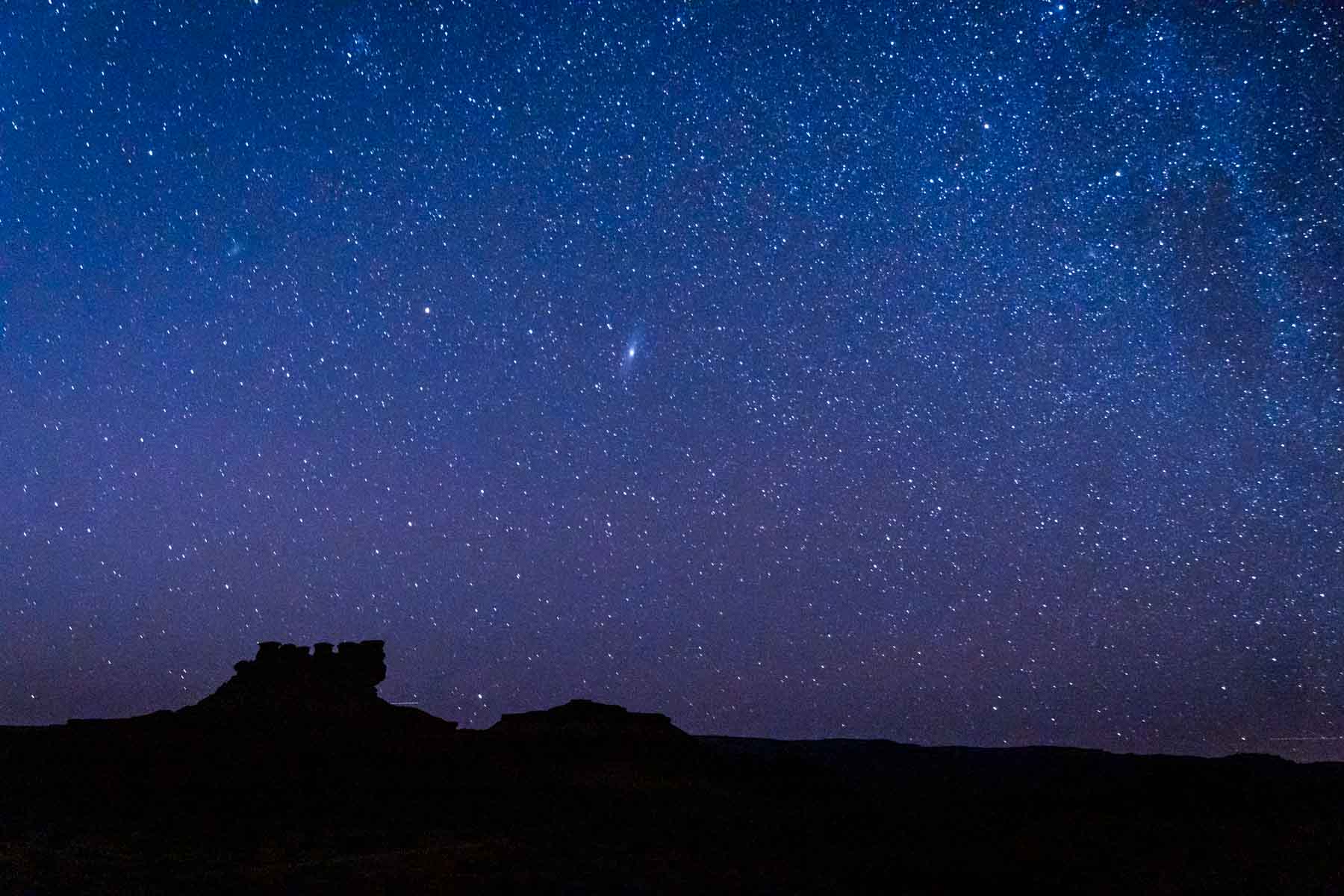
1. Big Bend National Park
Best Time to Go to Big Bend for Stargazing: Fall and Winter
In remote southwest Texas, Big Bend National Park covers over 800,000 acres of rugged desert landscape, stunning canyons, and the Chisos Mountains range. The park is named after a large bend in the Rio Grande that outlines its boundary with Mexico.
Regarding stargazing, Big Bend boasts some of the darkest skies in the contiguous United States. Its high altitude and remote location, with little human activity and few artificial lights nearby, make for incredibly dark and unobstructed views of thousands of stars.
Best Spots for Stargazing: Panther Junction, Santa Elena Canyon, Chisos Basin
📖 Read Also: Perfect One Day in Big Bend National Park Itinerary
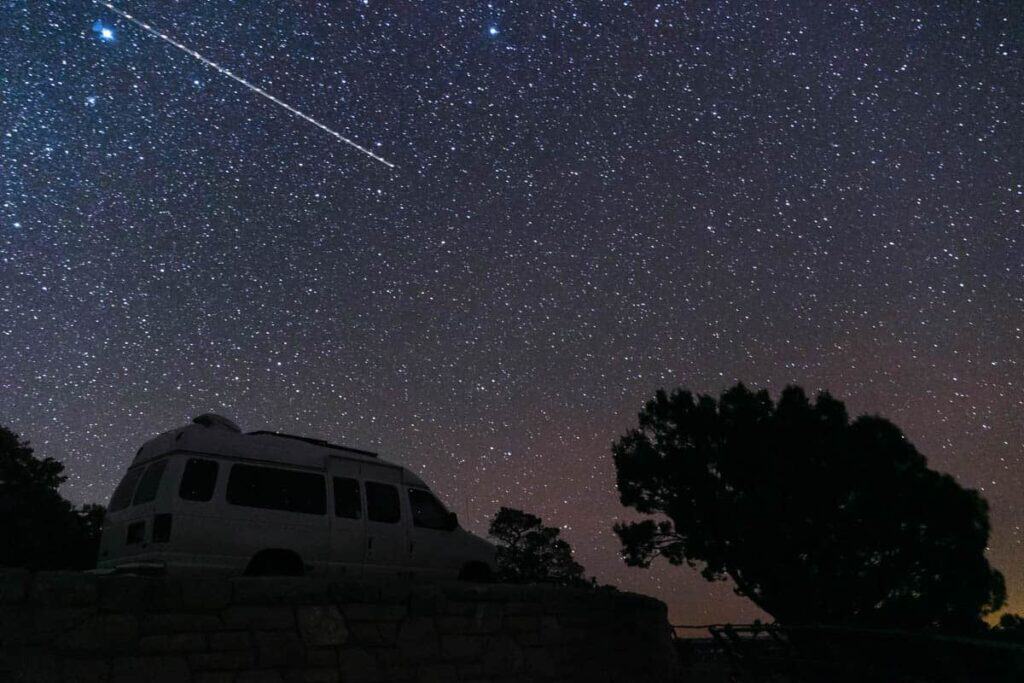
2. Grand Canyon National Park
Best Time to Go to Grand Canyon for Stargazing: Summer and Fall
Grand Canyon National Park in northern Arizona is the creme-de-la-creme of national parks in the United States. This expansive park covers over 1.2 million acres and is home to the awe-inspiring Grand Canyon, carved by the Colorado River. The park’s diverse ecosystems range from forests on the North Rim to desert basins along the Colorado River.
As I can attest, the Grand Canyon has spectacularly clear skies, especially at higher elevations found on the North Rim. The combination of its high-altitude locations and arid desert climate means minimal humidity, creating excellent conditions for stargazing. Light pollution is also minimal, providing a nearly unobstructed view of the Milky Way and numerous constellations.
Best Spots for Stargazing: The park has designated several areas as “Stargazing Spots,” which are away from the main visitor areas like Desert View Watchtower, Lipan Point, and Yavapai Point.
📖 Read Also: One Day in Grand Canyon South Rim: First-Timers Itinerary
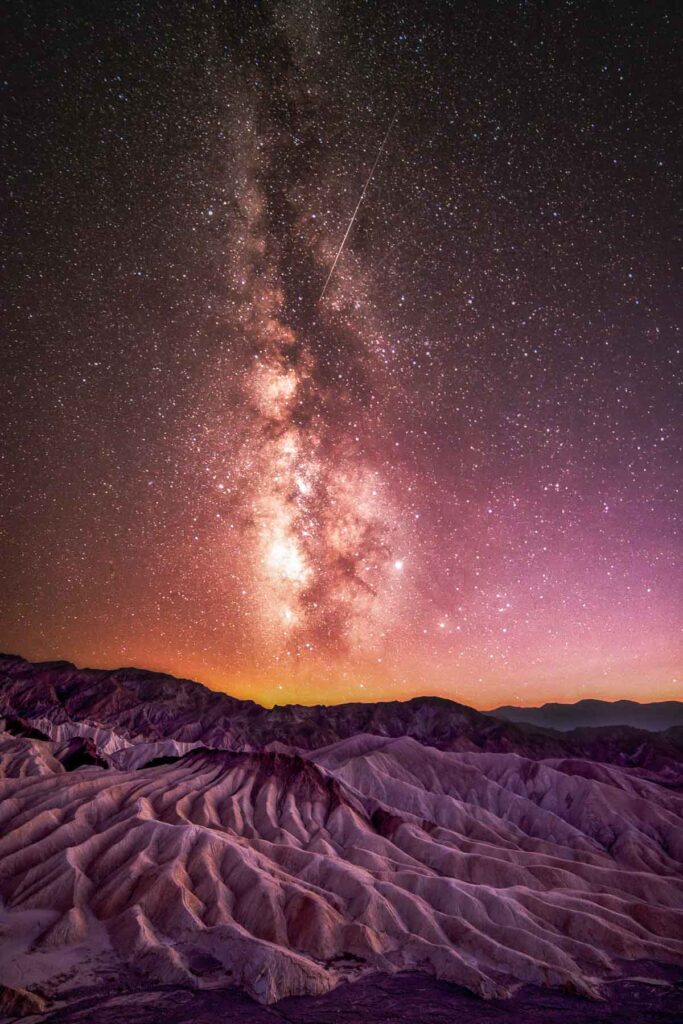
3. Death Valley National Park
Best Time to Go to Death Valley for Stargazing: Winter and Spring
Death Valley National Park, spanning over 3.4 million acres in California and Nevada, is renowned for its extreme landscapes. This vast park features salt flats, sand dunes, badlands, valleys, canyons, and mountains. Despite its name, Death Valley is teeming with life that has adapted to its harsh conditions.
The park’s skies are nothing short of legendary. The atmosphere is exceptionally clear at high altitudes, such as those found in Telescope Peak and Dante’s View. The absence of humidity and minimal light pollution allows for the Milky Way and other celestial wonders to shine brightly against the dark, expansive sky.
Best Spots for Stargazing: Badwater Basin, Mesquite Flat Sand Dunes, and Harmony Borax Works
📖 Read Also: Perfect One Day in Death Valley Itinerary
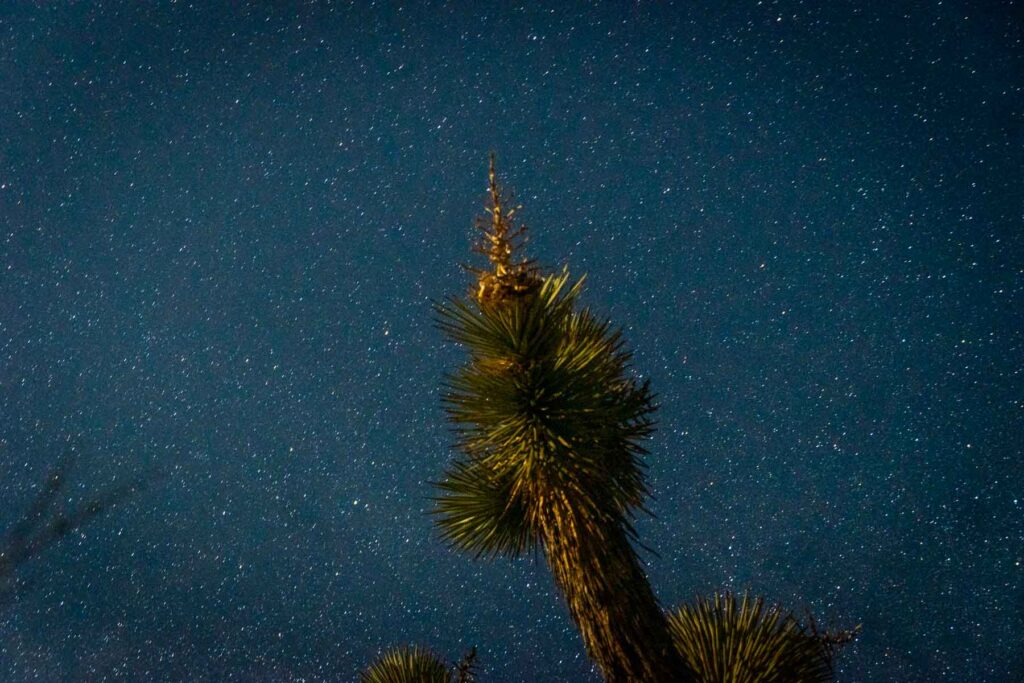
4. Joshua Tree National Park
Best Time to Go to Joshua Tree for Stargazing: Fall and Winter
Joshua Tree National Park in southeastern California is characterized by its landscapes formed by the meeting of the Mojave and Colorado deserts. The park is named after the namesake Joshua trees that dot its terrain and is a popular place for rock climbing on its unique boulder mounds.
As one of the designated dark sky parks, the park’s high-altitude location and remote desert setting combine to provide minimal light pollution.
Best Spots for Stargazing: Hidden Valley, Keys View, and Cottonwood Campground
📖 Read Also: Perfect One Day in Joshua Tree Itinerary for First-Timers
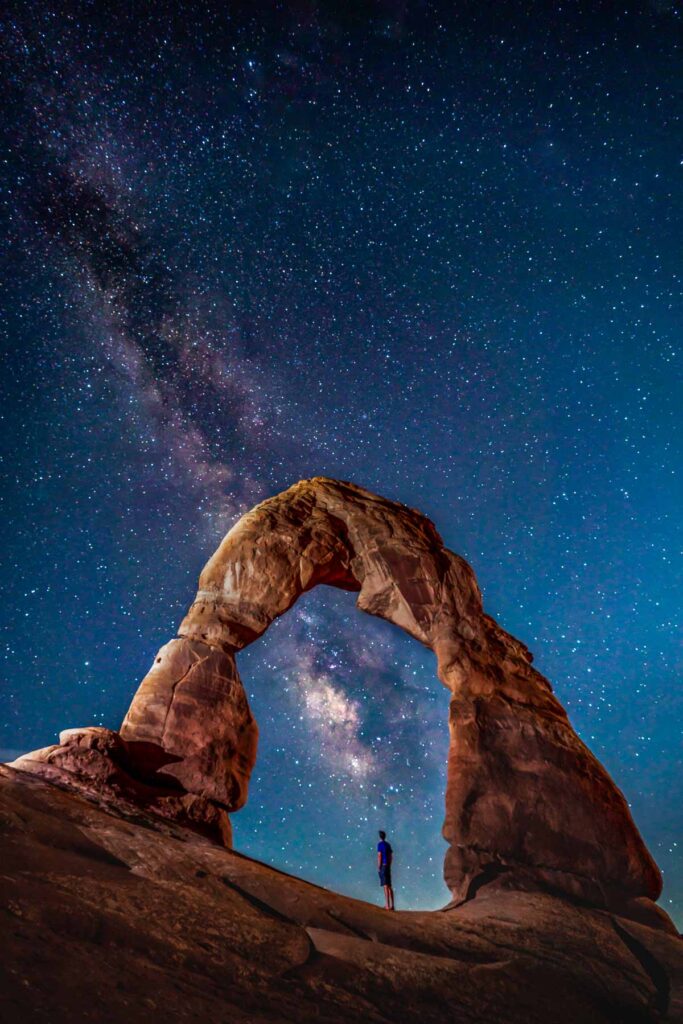
5. Utah’s Big Five National Parks
Best Time to Go to Utah’s Big Five for Stargazing: Spring and Fall
I’m cheating a bit since I am including all of Utah’s “Big Five” national parks in this entry, but all are officially designated International Dark Sky Parks. These parks include Zion, Bryce Canyon, Arches, Canyonlands, and Capitol Reef National Parks.
Each of these parks have unique stargazing experiences in their own right, from seeing the silhouette sandstone arches of Arches National Park to the towering hoodoos of Bryce Canyon National Park. But what they all have in common is their incredibly dark skies that offer breathtaking views of the stars.
Best Spots for Stargazing: Zion’s Watchman Campground, Arches’ Delicate Arch Viewpoint, Bryce Canyon’s Sunset Point, Canyonlands’ Needles District, and Capitol Reef’s Cathedral Valley
📖 Read Also: 7 Coveted National Park Experiences that Require Entering a Lottery
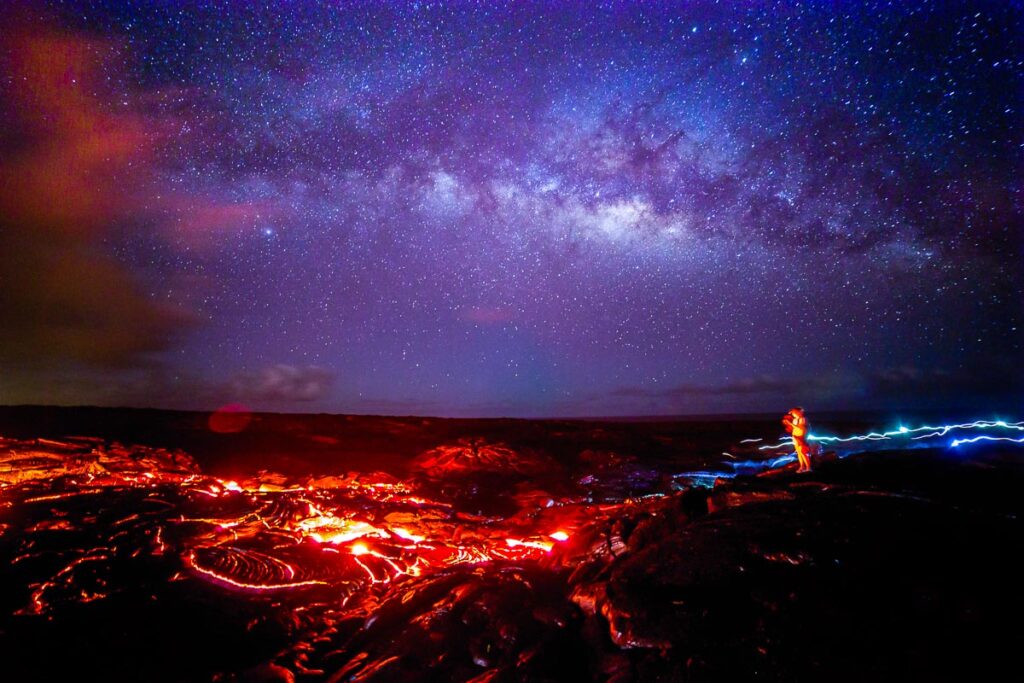
6. Volcano National Park
Best Time to Go to Volcano for Stargazing: Winter and Spring
Volcano National Park is famous for its dynamic volcanic landscapes, including active volcanoes such as Kīlauea and Mauna Loa. The park covers over 300,000 acres, illustrating the raw power of nature with its craters, lava tubes, and calderas.
Hawaii may not be the first place that comes to mind when you think of stargazing, but Volcanoes National Park on Hawaii is a prime spot for it. In fact, Mauna Kea, a dormant volcano within the park, is home to some of the world’s most advanced astronomical observatories. Visitors can join stargazing tours or attend one of the park’s many star parties throughout the year.
Best Spots for Stargazing: Mauna Loa Lookout and Mauna Kea Visitor Information Station
📖 Read Also: Perfect One Day in Volcano National Park Itinerary
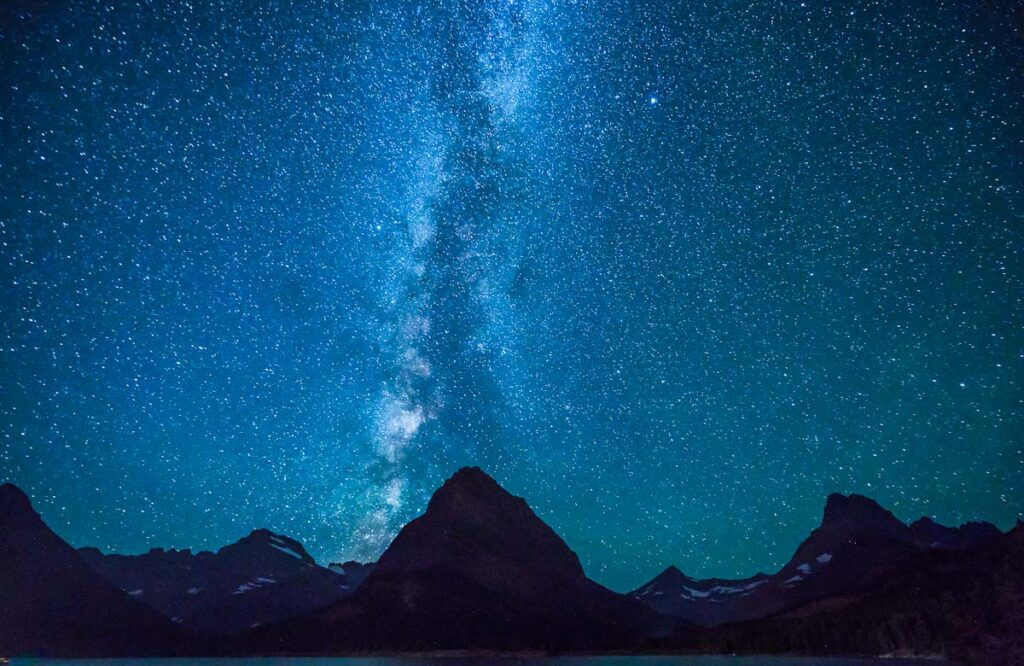
7. Glacier National Park
Best Time to Go to Glacier for Stargazing: Summer and Early Fall
Glacier National Park climbs up and around the northern Rocky Mountains of Montana. The entire park spans over a million acres and has some of the most dramatic landscapes in the USA, including rugged mountains, pristine forests, and over 130 named lakes.
Glacier National Park and Waterton Lakes National Park in Canada together form the world’s first International Peace Park. This makes them recognized as the first IDA International Dark Sky Parks that span both sides of an international border.
If you’re lucky, you may occasionally glimpse the Northern Lights here.
Best Spots for Stargazing: Logan Pass, Lake McDonald Lodge, and Many Glacier Campground Amphitheater
Final Thoughts: Best National Parks for Stargazing
There’s nothing quite like being out in nature and feeling the insignificance of your place in the universe. Aside from incredible landscapes and wildlife, National parks offer some of the best stargazing experiences in the world.
If you’re looking for more inspiration, don’t forget to check out our other fun guides on cool spots to visit in the West USA.
Before you Close That Tab…Looking for More Inspiration?
- The Top 8 Hardest Hikes in US National Parks and Why They’re Worth It
- 11 Dreamy Lakes in West USA That Will Take Your Breath Away
- 9 Overrated Tourist Traps in the US to Steer Clear of During Your Next Road Trip
Catherine, a seasoned travel writer, has lived in 4 different states and explored 36 states and 28 national parks. After spending two years embracing van life, she's now dedicated to sharing her vast knowledge of day trips across America. Catherine's other works has been referenced in major publications like MSN, Self, and TripSavvy.
| MY FAVORITE TRAVEL RESOURCES |
✈️ Find amazing guided tours and experiences with Viator to maximize your time! 🏘️ Plan ahead and secure your accommodation with Booking.com in advance. 🧾 Rent a car with Discovercars in advance and get the best prices for your day trip adventures. |

